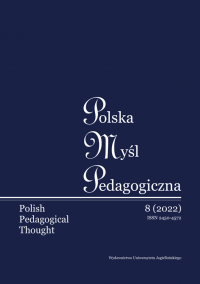Konserwatywne aspekty myśli społeczno-wychowawczej Adama Skwarczyńskiego
Conservative Aspects of Social and Educational Thought of Adam Skwarczyński
Author(s): Elwira JOLANTA KRYŃSKASubject(s): Philosophy, History of Education, Sociology of Education, Pedagogy
Published by: Wydawnictwo Uniwersytetu Jagiellońskiego
Keywords: Conservatism; conservative; state; deed
Summary/Abstract: The aim of this article is to analyze the conservative aspects of the social and educational thought of Adam Skwarczyński, the leading ideologist of the educational work of the Piłsudski’s camp. His achievement was the creation of the educational and ideological foundations of this group. He has also made an effort to build the ideological foundations of the education of “a new man in Poland.” He pointed out how great are the limits of humanity, how unlimited is the power of the human spirit.It was he who started the “Polish conservative revolution” in the program issue of the Piłsudski’s magazine Droga already in 1922. As the author of Thoughts about a new Poland, he proclaimed moral healing and the need to develop a sense of the state in society. He supported the conservative wing of the Sanacja camp and appreciated the element of tradition, recognizing that “the nation is first and foremost product of the state and the common history of its citizens.” In his opinion, tradition is, firstly, an idea that constitutes a permanent basis of the nation’s self-knowledge, and secondly, it is also a revolutionary idea. In the achievements of the past, “he saw the power of the future.” And based on Piłsudski’s indication of “Go and do,” he created the so-called ideology of the act, which is the basis of the socio-educational concept. As a consequence, Skwarczyński’s conservative thought crystallized around the category of nation, state, tradition and deed. The infallibility of his moral judgments gives him unbelievable power of authority and encourages him to explore his ideological thought. All the more so because many contemporary Polish conservatives more often reach for texts by American libertarians and neoconservatives than for Polish writings – for example Skwarczyński, who referred “to the state as a political entity, around which a conservative reflection should focus.” He proclaimed that the optimal solution would be a meeting of the social initiative “from below” with the state authorities “from above.” In this context, it is hardly surprising that, according to Roger Scruton, “a conservative attitude is better suited to the modern mind as never before.”
Journal: Polska Myśl Pedagogiczna
- Issue Year: 8/2022
- Issue No: 8
- Page Range: 209-231
- Page Count: 23
- Language: Polish

